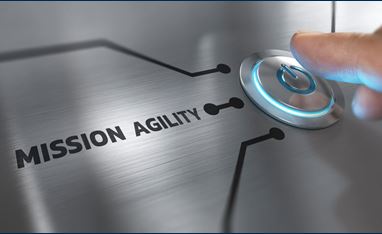Agile in Government Summit
 Infotech
Infotech
-
6/6/2018 - 6/7/2018 8:30 AM
-
Kellogg Conference Hotel at Gallaudet University
800 Florida Avenue NE
Washington, DC 20002
USA
Tel: 202-651-6000
GET DIRECTIONS -
Theme : Toward Mission Agility
Event Type : Conference
Event Code : 8A01
Description
Mission AgilityGovernment needs to respond more quickly to changes that affect its ability to successfully accomplish its missions.
Agile in Government is the annual event where experts address the practical adaptations necessary to make Government organizations more agile through digital transformation.
This year the theme of the event is Toward Mission Agility.
Whether it’s acquiring capabilities or serving customers the challenges include adopting agile at scale; effective cross-functional teams; governance in modular, incremental and iterative situations; agile for hardware; contracting, performance measurement and reporting, to include EVM on major acquisitions.
The pace of change has accelerated. Near-peer adversaries now field capabilities faster than the United States. The rapidly changing and adapting threat forces defense agencies to speed up their processes to counter the threat and maintain their technological edge.
Keynote Speakers

Major General Sarah Zabel
Director of Information Technology Acquisition Process Development
Office of the Assistant Secretary of the Air Force for Acquisition

Don Reinertsen
President of Reinertsen & Associates
Author of three best-selling books on product development.
Presentation Topics
The Basics: Introduction to Agile, SCRUM, DevOps and Lean
Creating An Effective Agile Acquisition Ecosystem
Agile in DHS
DoD Agile and EVM Desktop Guide for Program Managers
Contracting Case Studies
Agile Engineering for Complex Systems
Agile for Cyber
Digital Transformation
DevOps for Government
Agile Architecture
Lean Startup in Government
Attend the Summit - Stay for the SAFe Meetup
Making agile work in Government contracts is a challenge. Real issues arise when the program leadership wants to work in a Lean-Agile way, but the contractor workforce is bound by contractual language that enforces a waterfall model. How can you bridge this gap? In this session, Dr. Steve Mayner, SAFe Fellow and Principal Consultant at Scaled Agile, Inc. will lead a discussion and provide a preview of some of the answers provided to these challenges based on the SAFe for Government course.
This Meetup will begin immediately following the Summit adjournment on June 6th. RSVP for the Meetup at http://meetu.ps/e/FkYTM/CV6w5/f.
ADAPT
The purpose of ADAPT is to foster better understanding of how government agencies can employ agile software development methods to provide incremental and modular acquisition of information systems.
Across government, military and civilian realms, the rapid evolution of information technology has sparked a digital transformation of organizational activities and processes. Whether it is Cloud First or cybersecurity, digital transformation is fully leveraging the changes and opportunities now possible with a mix of digital technologies. These include automation, data exchanges, cloud, cyber-physical systems, robots, big data, artificial intelligence, learning systems, IoT and autonomy. Today, smart organizations – government and industry – are operating at the intersection of people, new technologies and innovation.
Agile in Government Summit Co-Host

The NDIA has a policy of strict compliance with federal and state antitrust laws. The antitrust laws prohibit competitors from engaging in actions that could result in an unreasonable restraint of trade. Consequently, NDIA members must avoid discussing certain topics when they are together – both at formal association membership, board, committee, and other meetings and in informal contacts with other industry members: prices, fees, rates, profit margins, or other terms or conditions of sale (including allowances, credit terms, and warranties); allocation of markets or customers or division of territories; or refusals to deal with or boycotts of suppliers, customers or other third parties, or topics that may lead participants not to deal with a particular supplier, customer or third party.
